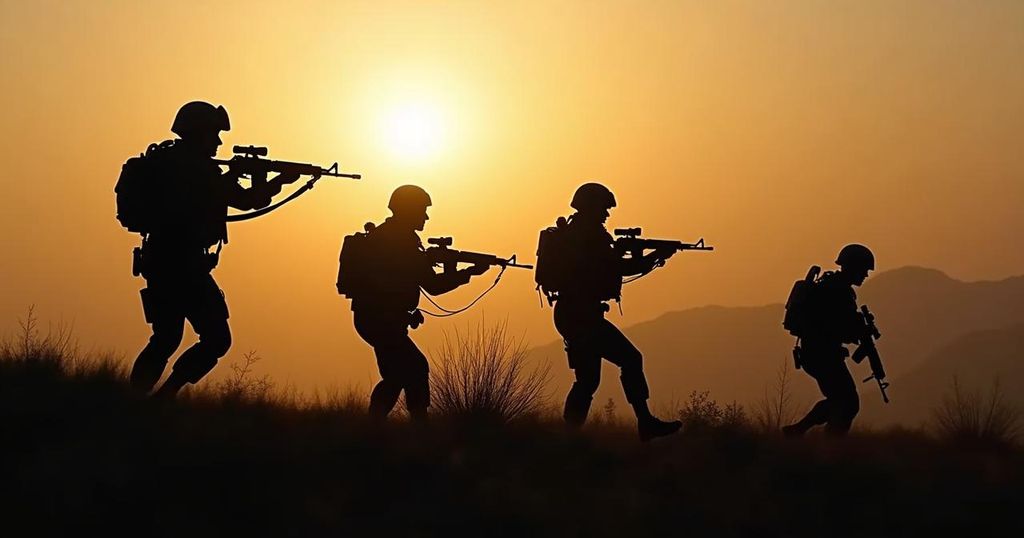Prime Minister Benjamin Netanyahu is intensifying military operations against Hezbollah, overlooking U.S. diplomatic warnings. Israeli forces have been conducting raids in Lebanon, potentially setting the stage for a ground invasion. President Biden’s efforts to prevent escalation face criticism as U.S. arms support continues. The recent assassination of Hezbollah’s leader further complicates the situation, leading to significant regional implications and calls for restraint from the U.S.
Israeli Prime Minister Benjamin Netanyahu is intensifying military operations against the Iran-backed militant group Hezbollah, disregarding warnings from the United States and escalating the conflict in the region. According to reports from The Wall Street Journal, Israeli special forces have been conducting raids in southern Lebanon, aiming to gather intelligence on Hezbollah’s vulnerabilities ahead of a potential ground invasion. Retired Israeli military official Amir Avivi disclosed that preparations for this incursion have been underway, indicating a significant escalation that Israeli leaders have anticipated for months. Following these operations, Israel executed unprecedented strikes in central Beirut, marking the first such military action in the area since 2006. These attacks saw the death of a prominent Hamas leader within Lebanon, further heightening tensions following the assassination of Hezbollah’s leader, Hassan Nasrallah, earlier in the week. This series of events has prompted concerns over the possibility of a broader confrontation involving Iran. In contrast, President Joe Biden has been striving to prevent the conflict from escalating further, yet critics argue that his administration’s military support for Israel undermines these diplomatic efforts. “Without US support, this war would not have been possible,” stated Gilbert Achcar, a Professor of International Relations. Numerous observers highlight that Netanyahu’s government is continuing its military campaign with little regard for American attempts to instill restraint, and the US’s provision of arms facilitates this ongoing conflict. Despite an apparent willingness to negotiate a ceasefire, the assassination of Nasrallah reportedly caught US officials by surprise, as Netanyahu did not inform them of the planned operation. The White House has described this killing as “a measure of justice for his many victims”, while still pressing for restraint on further military actions. Notably, a former British military commander indicated that Netanyahu appears to believe he is succeeding in this conflict, leading to expectations of a ground invasion in Lebanon. However, he cautioned that the US, despite its calls for restraint, continues to supply Israel, thereby limiting its influence. In terms of arms provision, the US has significantly supported Israel, having allocated at least $12.5 billion in military aid since the conflict began. Yet, notwithstanding the historical partnership, Netanyahu has routinely disregarded Biden’s “red lines” regarding military operations, with analysts arguing that the US’s insufficient pressure may contribute to the ongoing hostilities. As the situation evolves, Secretary of State Antony Blinken reiterated the potential for increased instability should Israel reject diplomatic avenues, noting that the actions taken by all involved parties will have lasting repercussions for regional security and peace.
The ongoing conflict between Israel and Hezbollah is a complex geopolitical issue that has significant implications for regional stability. Over the years, escalating tensions have often involved military engagements and retaliatory actions by both sides. Recent events, particularly following the October 7 terrorist attacks, have exacerbated these tensions, prompting Israeli military operations in both Gaza and Lebanon. U.S. involvement, particularly through arms supplies and diplomatic efforts, has sought to mitigate the escalation of conflict while balancing support for Israel.
In summary, Prime Minister Netanyahu’s recent military actions against Hezbollah, marked by significant airstrikes and special operations, illustrate a deliberate disregard for U.S. warnings and diplomatic efforts aimed at preventing further hostilities. The ongoing support from the United States has implications for the dynamics of this conflict, even as criticism mounts regarding the effectiveness of such assistance in curbing Israeli military actions. As regional tensions threaten to escalate into a broader war, it remains critical for all parties to engage in diplomatic dialogue to avoid prolonged instability.
Original Source: www.businessinsider.com






